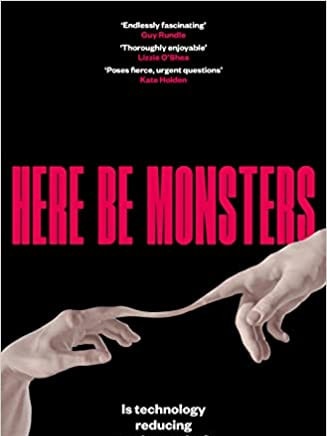Here Be Monsters book review: Losing our souls to the AI machines
When a machine can become ‘artificially intelligent’, what does it mean to be human? And who do these inventions truly serve? The answer is simple and disquieting.

The tools we use form our sense of the world. They shape our environments, our bodies and our minds. What we make makes us. This is the primal given of Here Be Monsters, Richard King’s crisply written, exhaustively researched and ultimately terrifying overview of humanity’s relationship to technology in the 21st century.
But it is only a starting point. That we are homo faber – “man the maker” – is a truism easily absorbed. What is less obvious, in part because of technology’s omnipresence in the rich West, partly because of the discourse of inevitability that surrounds tech and the speed with which its new iterations arrive, is the thesis King lays out: that, thanks to recent technological developments, we now stand “in a radically different relationship with our environment than ever before”.

King argues that our old command of technology represented a natural extension of the world as it existed. A hammer extends the power of the human arm. The narrowing of two banks on a river suggests the site for a bridge.
Today, he writes, we are “able not only to harness capricious nature according to our will, but also to intervene in nature at the level of the atom, the molecule and the gene. We can now intervene in the very stuff of nature itself, up to and including our own biology”.
“Nanotechnology means we can fabricate new materials on the scale of atoms and molecules. Emerging biotechnologies are poised to enhance longevity by turning back the telomere “clock” that triggers the cell’s demise.
“Information technologies allow tech companies not only to seed the world with new forms of intelligence but also to harvest huge amounts of data with a view of constructing … a voodoo-doll vision of humanity in which people are perpetually dosed, nudged and prodded with subliminal cues.”
We have arrived in a new and unprecedented place, King argues, without thinking through the consequences for human flourishing and even human nature that these developments portend. Here Be Monsters is an effort to do so. It seeks to apply a humanistic lens to this febrile moment – to ask how technology might serve humans rather than the other way round.
As such, the work is less about technology per se than about the ways in which older ways of thinking about what it is to be human might be arrayed against what King calls the “fetishisation of progress”, whether in the unthinking instrumentalism of emergent technoscience or the dangerous Utopianism of silicon valley’s “new Prometheans”, Tech Bros allied to a neoliberal drive to profit rather than a more holistic vision of our relationship to technology.
This is not to say that King is a Luddite. Over the course of three essays that lay out, respectively, the loss of physical presence enabled by an ever more digital world that has fragmented our relationship with each other and external nature; the ways in which the technosciences are urging a symbiosis of the human and the technological, threatening to definitively unmake our vision of what it is to be human; and finally, with one eye to fast-emerging AI, the question of human creativity and agency when faced with technologies that promise to take our jobs and perhaps even our freedom as political entities, the author registers an appropriate awe at such massed ingenuity while asserting the right to ask: Who do these inventions truly serve?
King’s answer is simple and disquieting. This late phase of industrialisation – a period where the last Commons, the centimetres between our ears, have been enclosed, when our genetic data is set to be privatised, when automation and AI have begun to replace human workers wherever possible – has resulted in the greatest accumulation of wealth in the smallest number of hands in our history. As Wendell Berry had it: “The latest technology is not always good for anything except to the producers of the technology.”
King has not set out to admonish the evils of unchecked capital or rail against all tech; his tone is admirably balanced throughout. But what he does ask of us – and having arrayed such a range of data and synthesised it with such insight and rhetorical brio, he has earnt our ear – is “to be alive to the social and political context in which particular technologies are developed”, to be unafraid of placing guardrails around new tech that inspires ambivalence.
It is “the privilege of fishes, as it is of rats and wolves,” wrote John Ruskin, “to live by the laws of demand and supply; but the distinction of humanity, to live by those of right.” In these pages, King gives us the tools to recover an older and richer sense of what it is to be human – to not be mere biological serfs for the technosciences to exploit.
But more than that, Here Be Monsters asks us to resist the urge to damage our very nature to accommodate technology’s unchallenged march. “We need a new language in which to talk about technology,” King concludes, “on pain of being overrun by its powers. Our freedom and flourishing depend on it.”
Geordie Williamson has been chief literary critic of The Australian since 2008
Here Be Monsters








To join the conversation, please log in. Don't have an account? Register
Join the conversation, you are commenting as Logout